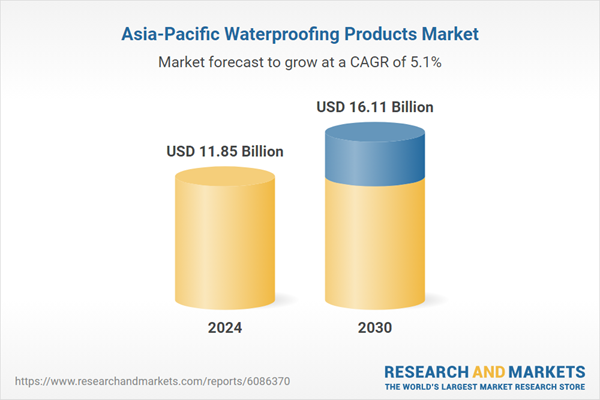Speak directly to the analyst to clarify any post sales queries you may have.
10% Free customizationThis report comes with 10% free customization, enabling you to add data that meets your specific business needs.
The market includes various solutions such as liquid-applied membranes, cementitious products, bituminous coatings, and sheet-based membranes, which are vital for protecting structures in moisture-prone areas like roofs, basements, and wet zones. China continues to lead due to large-scale infrastructure development and building retrofits, while India benefits from government-led housing and urban renewal schemes. The region’s tropical climates and rising investments in commercial infrastructure, tourism, and public utilities further strengthen the need for reliable and durable waterproofing materials.
Key Market Drivers
Rapid Urbanization and Infrastructure Development
Urban growth across Asia-Pacific is accelerating rapidly, particularly in countries such as India, Indonesia, and the Philippines. With India projected to have over 40% of its population residing in urban centers by 2030, the construction of affordable and high-density housing is a priority. At the same time, infrastructure investment is on the rise, with regional capital expenditure expected to increase from approximately USD 1.46 trillion in 2022 to USD 1.74 trillion by 2030. These trends drive substantial demand for waterproofing solutions to protect structures from moisture damage and extend their life cycles. Waterproofing is becoming a standard specification in residential, commercial, and infrastructure projects under smart city and urban modernization initiatives, making it an essential component of sustainable urban development.Key Market Challenges
Volatility in Raw Material Prices
The waterproofing products market is significantly affected by the price instability of key raw materials such as bitumen, synthetic rubber, and polyurethane, which are derived from crude oil. These materials are highly susceptible to fluctuations caused by geopolitical events, global supply disruptions, and shifting trade dynamics. In 2024, manufacturers reported price increases of 15-20% for core inputs, leading to margin pressure and cost uncertainty throughout the supply chain.Smaller manufacturers are particularly exposed, often lacking the capacity to absorb or offset these costs. Price unpredictability complicates long-term pricing contracts and makes budget planning difficult for both suppliers and contractors. Although bio-based and recycled material alternatives are being explored, they are not yet cost-effective or scalable for widespread adoption. This persistent raw material volatility remains a key obstacle for the market.
Key Market Trends
Increased Focus on Green and Low-VOC Waterproofing Products
Sustainability is becoming increasingly central in the Asia-Pacific waterproofing sector, with growing demand for non-toxic, low-VOC, and eco-friendly materials. Governments across the region are tightening building codes and promoting green construction standards, encouraging the shift away from solvent-based waterproofing. Manufacturers are responding by introducing water-based, recycled-content, and bio-based formulations.Programs such as NABERS in Australia and CASBEE in Japan are setting benchmarks for performance, while India and Southeast Asia are gradually implementing similar standards. Construction firms involved in green-certified projects like LEED or EDGE are specifying environmentally responsible materials, further accelerating this trend. As a result, manufacturers are investing in sustainable product development, recyclable packaging, and long-lasting formulations that align with circular economy principles. Sustainability is becoming a market differentiator, particularly in urban centers with growing environmental consciousness.
Key Players Profiled in this Asia-Pacific Waterproofing Products Market Report
- Berger Paints India Limited
- Sika AG
- BASF SE
- Ardex Group
- Koster Bauchemie AG
- RPM International Inc.
- The Dow Chemical Company
- Tremco Incorporated
- Mapei S.p.A.
- Arkema S.A.
Report Scope:
In this report, the Asia-Pacific Waterproofing Products Market has been segmented into the following categories, in addition to the industry trends which have also been detailed below:Asia-Pacific Waterproofing Products Market, by Product Type:
- Waterproof Paints
- Polymer Waterproof Sheets
- Rigid Waterproof Materials
- Asphalt Waterproof Rolls
- Building Seal Waterproof Materials
- Others
Asia-Pacific Waterproofing Products Market, by Application:
- Roofing & Walls
- Floors & Basements
- Bridges & Highways
- Water & Waste Management
- Tunnel Liners
- Others
Asia-Pacific Waterproofing Products Market, by Country:
- China
- Japan
- India
- South Korea
- Australia
- Singapore
- Thailand
- Malaysia
Competitive Landscape
Company Profiles: Detailed analysis of the major companies present in the Asia-Pacific Waterproofing Products Market.Available Customizations:
With the given market data, the publisher offers customizations according to a company's specific needs. The following customization options are available for the report.Company Information
- Detailed analysis and profiling of additional market players (up to five).
This product will be delivered within 1-3 business days.
Table of Contents
Companies Mentioned
The leading companies profiled in this Asia-Pacific Waterproofing Products market report include:- Berger Paints India Limited
- Sika AG
- BASF SE
- Ardex Group
- Koster Bauchemie AG
- RPM International Inc.
- The Dow Chemical Company
- Tremco Incorporated
- Mapei S.p.A.
- Arkema S.A.
Table Information
| Report Attribute | Details |
|---|---|
| No. of Pages | 120 |
| Published | May 2025 |
| Forecast Period | 2024 - 2030 |
| Estimated Market Value ( USD | $ 11.85 Billion |
| Forecasted Market Value ( USD | $ 16.11 Billion |
| Compound Annual Growth Rate | 5.0% |
| Regions Covered | Asia Pacific |
| No. of Companies Mentioned | 11 |









